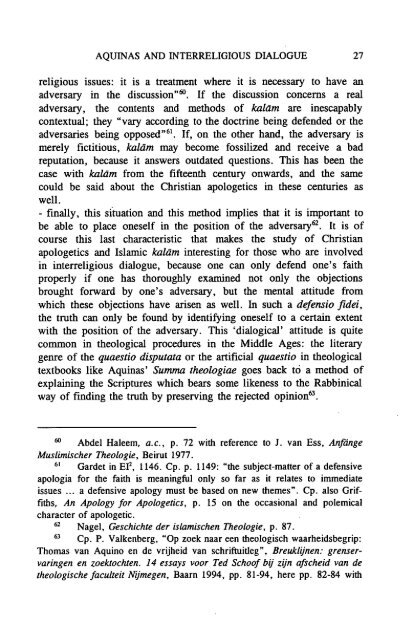Jaarboek Thomas Instituut 1997 - Thomas Instituut te Utrecht
Jaarboek Thomas Instituut 1997 - Thomas Instituut te Utrecht
Jaarboek Thomas Instituut 1997 - Thomas Instituut te Utrecht
Create successful ePaper yourself
Turn your PDF publications into a flip-book with our unique Google optimized e-Paper software.
AQUINAS AND INTERRELIGIOUS DIALOGUE 27<br />
religious issues: it is a treatment where it is necessary to have an<br />
adversary in the discussion'?". If the discussion concerns a real<br />
adversary, the con<strong>te</strong>nts and methods of kaläm are inescapably<br />
con<strong>te</strong>xtual; they "vary according to the doctrine being defended or the<br />
adversaries being opposed?". If, on the other hand, the adversary is<br />
merely fictitious, kaläm may become fossilized and receive a bad<br />
reputation, because it answers outda<strong>te</strong>d questions. This has been the<br />
case with kaläm from the fif<strong>te</strong>enth century onwards, and the same<br />
could be said about the Christian apologetics in these centuries as<br />
well.<br />
- finally, this situation and this method implies that it is important to<br />
be able to place oneself in the position of the adversary". It is of<br />
course this last charac<strong>te</strong>ristic that makes the study of Christian<br />
apologetics and Islamic kaläm in<strong>te</strong>resting for those who are involved<br />
in in<strong>te</strong>rreligious dialogue, because one can only defend one's faith<br />
properly if one has thoroughly examined not only the objections<br />
brought forward by one's adversary, but the mental attitude from<br />
which these objections have arisen as well. In such a defensio fidei,<br />
the truth can only be found by identifying oneself to a certain ex<strong>te</strong>nt<br />
with the position of the adversary. This 'dialogical' attitude is qui<strong>te</strong><br />
common in theological procedures in the Middle Ages: the li<strong>te</strong>rary<br />
genre of the quaestio disputata or the artificial quaestio in theological<br />
<strong>te</strong>xtbooks like Aquinas' Summa theologiae goes back to a method of<br />
explaining the Scriptures which bears some likeness to the Rabbinical<br />
way of finding the truth by preserving the rejec<strong>te</strong>d opinion".<br />
60 Abdel Haleem, a.c., p. 72 with reference to J. van Ess, Anfänge<br />
Muslimischer Theologie, Beirut 1977.<br />
61 Gardet in Er, 1146. Cp. p. 1149: "the subject-mat<strong>te</strong>r of a defensive<br />
apologia for the faith is meaningful only so far as it rela<strong>te</strong>s to immedia<strong>te</strong><br />
issues ... a defensive apology must be based on new themes". Cp. also Griffiths,<br />
An Apology for Apologetics, p. 15 on the occasional and polemical<br />
charac<strong>te</strong>r of apologetic.<br />
62 Nagel, Geschich<strong>te</strong> der islamischen Theologie, p. 87.<br />
63 Cp. P. Valkenberg, "Op zoek naar een theologisch waarheidsbegrip:<br />
<strong>Thomas</strong> van Aquino en de vrijheid van schriftuitleg", Breuklijnen: grenservaringen<br />
en zoektoch<strong>te</strong>n. 14 essays voor Ted Schoof bij zijn afscheid van de<br />
theologische facul<strong>te</strong>it Nijmegen, Baarn 1994, pp. 81-94, here pp. 82-84 with








